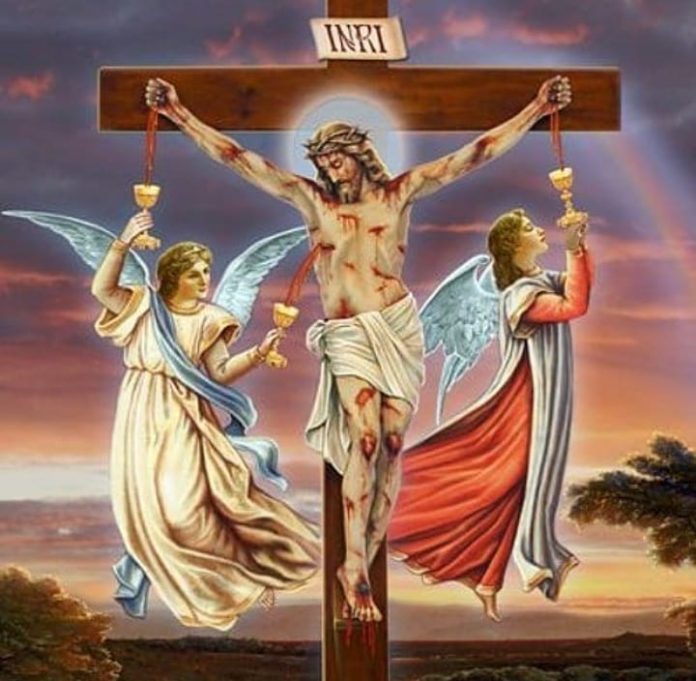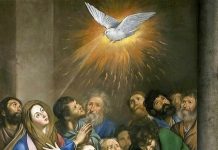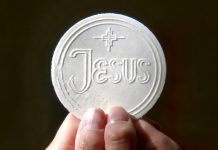Today we are meeting two persons, first being none other than Jesus of Nazareth. Mathew’s gospel introduces Jesus the Nazorean in these words: ‘There he made his home in a town called Nazareth, so that what had been spoken through the prophets might be fulfilled, “He will be called a Nazorean.” (Mt 2:23).
In those days it was unimaginable for he Jews to think that their savior, the Messiah would come from Nazareth. Because the Messiah was supposed to come from Bethlehem, the city of David. It is another thing that they could not recognise the Son of God who was born in Bethlehem! Nathanael’s question reflects the doubt of an ordinary Jew. “Can anything good come out of Nazareth?”(Jn 1:46). But for ‘come and see’, what other reply Philip could give him! This brief reply contains everything. Doubters should stop asking questions. Instead they should go and see. When Nathanael went and saw Jesus all his doubts were cleared and he did not leave Jesus thereafter.
But not all Jews could ‘go and see’ the way Nathanael did, nor did they get the grace to understand Jesus. Certainly they accepted Jesus as a great prophet from Nazareth. The signs and miracles performed by Jesus were before their eyes. They had no doubt that God was with Jesus. Nicodemus also says; “Rabbi, we know that you are a teacher who has come from God; for no one can do these signs that you do apart from the presence of God” (Jn 3:2). The inscription over the head of Jesus on the holy cross also described the person as ‘Jesus of Nazareth’. It was written in Latin, Greek and Hebrew so that nobody should miss it.The centurion who was witness to the crucifixion of Jesus realize who Jesus was only after the Lord accomplished the eternal sacrifice for all humanity. It was Jesus of Nazareth who gave the gentile centurion the strength to proclaim what many Jews could not admit; “Truly this man was God’s Son.”
Then we have Cleopas and another disciple who were treading the lonely road from Jerusalem to Emmaus. Though their eyes were kept from recognizing him, their discussion was about Jesus from Nazreth. They got their eyes opened and could recognize Jesus only when he blessed the bread, broke it and gave it to them. As for Nicodemus, this truth was revealed much before. This is why he came with a mixture of myrrh and aloes weighing about a hundred pounds to pay his tributes to the man whom he met for the first time in the privacy of a night. This time he was bold enough to declare his allegiance to Jesus before the fall of night on that eventful day.
Jesus of Nazareth! As Simeon said, he was the one who was destined for the falling and the rising of many in Israel, and who was to be a sign that will be opposed.
Now comes the second person, the Son of David; the Savior of whom God revealed through His prophets centuries before, that the Messiah, the Son of David should come from Bethlehem. Jews never doubted that the coming Christ should be the Son of David. It is apparent that Jesus of Nazareth and Son of David are one and the same. Certainly both the names refer to Jeus Christ. But people recognized him in two different ways. Majority of them recognized him as Jesus from Nazareth. But a few like Nicodemus and the centurion on duty at Calvary, understood the man as the Son of David. Remember the prophecy of Simeon that Jesus should be a sign that will be opposed.
As fulfilment of the verses that ‘whoever welcomes a prophet in the name of a prophet will receive a prophet’s reward; and whoever welcomes a righteous person in the name of a righteous person will receive the reward of the righteous’ ( Mt 10:41), those who recognised Jesus as a prophet from Nazareth received its reward and those who recognized him as the Son of David received its reward.
In the gospel of Luke we read about a blind beggar from Jericho. He was sitting by the roadside begging. When he heard a crowd going by he asked what was happening. They told him that it was Jesus of Nazareth. A large crowd was accompanying Jesus, the great prophet from Nazareth, the great teacher who performed miracles and in whom God was pleased. His words about God and his teachings about the kingdom of heaven were deeply engraved in their hearts. Those words were not like the monotonous sermons of their teachers. They praised Jesus of Nazareth for the great deeds that God did through his hands.
On the other hand, it was a totally different image of Jesus that came to the mind of the beggar. Though blind, he understood that the person who was passing by was no ordinary prophet from Nazareth, as the crowd told him in one voice. This Jesus is the Savior whom they were expecting for centuries. Messiah, the Son of David! So he cried out with all his might: “Jesus, Son of David, have mercy on me!” Naturally it should have irked the crowd. They knew that Jesus was a prophet from Nazareth. But here a blind beggar is calling him the Son of David. Luke records that the crowd sternly ordered the blind man to be quiet. It was impossible for them to permit somebody, that too a blind beggar, holding a different view from the general opinion. But their orders could not silence him. Rather he raised his sound and shouted even more loudly; “Son of David, have mercy on me!” Jesus could not but stand still. And Jesus left only after doing what the blind beggar wanted him to do!
A blind man could see what thousands with open eyes could not see. He saw the person,whom others saw as Jesus from Nazareth, as ‘Son of David’. It is not surprising. Because Jesus himself once said; “I came into this world for judgement so that those who do not see may see, and those who do see may become blind” (Jn 9:37)
The Scripture tells us about another person who also recognized Jesus Christ as the Son of David. It was a Canaanite woman from the region of Tyre and Sidon. She was a woman born into a gentile family. A woman who did not have anything to claim on David or the Messiah who was to take birth from the house of David. Yet what she shouted was,
” Have mercy on me, Lord, Son of David”(Mt 15:22). Perhaps none of the twelve disciples, who were Jews by birth, could not grasp the true meaning of what this Canaanite woman called their Master. Had they had any idea about it, they would not have recommended Jesus to send her away. We read that this poor woman who wanted nothing but the ‘crumbs that fall from the master’s table’ returned with everything that she wanted from the Master of the universe. We should remember that even Peter’s declaration – ‘You are the Messiah, the Son of the living God’ (Mt 16:16) – about Jesus came after this incident.
It is true that Jesus could be understood in two different ways. As Jesus the prophet from Nazareth and as the Son of David, the Savior. During the royal procession from the Mount of Olives to Jerusalem that Jesus undertook on a colt, the whole multitude that accompanied him shouted; “Hosanna to the Son of David! Blessed is the one who comes in the name of the Lord!”(Mt 21:9). But when the procession reached Jerusalem and when the whole city started asking, ‘who is this?’ the reply was a bit different. The crowd replied; “This is the prophet Jesus from Nazareth in Galilee ”. Two different perspectives! It cannot be otherwise, because he was supposed to be a ‘sign that will be opposed’.
This debate continues through centuries. For some of us, Jesus is a prophet, philanthropist, social reformer or revolutionary. They know him as Jesus of Nazareth who did many great and commendable things. They love him, or pretend to love him. For them Jesus is another name like Mohammed or Budha or Marx. They will write stories and novels using this name. They will mock him in cartoons and caricatures. They will depict him badly in films and television serials. They will mock and degrade him. Because, for them Jesus is just a man from Nazareth.
On the other hand, for the elect few, he is the Son of God, only Savior and only Redeemer. They know him as the Son of David and get the reward of their faith. For those who acknowledge him as the only Lord and Savior of mankind, ‘Jesus’ is the name that is above every name’. Because it is written; ‘There is no other name under heaven given among mortals by which we must be saved’ ( Acts 4:12).
When Peter and John were brought before the council on the charge of healing a person, they made it a point to reaffirm their faith in the great name of Jesus by saying, ‘Let it be known to all of you, and to all the people of Israel, that this man is standing before you in good health by the name of Jesus Christ of Nazareth, whom you crucified, whom God raised from the dead’ (Acts 4:10). After this proclamation of faith the council could not find any excuse to punish them. The firm stand of Peter and John was that it was not right in God’s sight to listen to men rather than to God. They categorically stated that they could not keep from speaking about what they have seen and heard.
Now what did they see and hear? They first saw Jesus as a prophet from Nazareth and heard his teachings. Later they saw with their own eyes what Jesus did that could not be done by any other person. They realized that this was no ordinary prophet but the Savior whom they were expecting for centuries. None of the apostles would have volunteered to die for Jesus, had he been just another prophet.
What is so special with the name of Jesus? It is the name that conquers the devil. This is why all devils have come together with their demonic armies to fight against the holy name of Jesus. When we read the instance of the disciples returning from their first evangelisation tour, we see that they were very much surprised to have the experience of even devils surrendering before the name of Jesus. What other testimony do we need to tell that there is nothing in this whole universe that can stand against the great name of Jesus. One of the biggest promises in the Bible is that God will grant anything that we ask Him in the name of Jesus Christ. Such is the greatness of this name. Yet those who confess the name of Jesus Christ in this world will not be spared from persecution. ‘You will be hated by all because of my name'( Lk 21:17).
It was God’s divine will that His only begotten son should be named Jesus. ‘She will bear a son, and you are to name him Jesus, for he will save his people from their sins’ (Mt 1:21). It is in Jesus’ name that God the Father sends the Holy Spirit who renews and sanctifies everything. Do we really understand the true power of the name Jesus? It needs divine grace to understand what this name suggests. John records the kind of persons to whom the real meaning of this name is revealed by the Father. “I have made your name known to those whom you gave me from the world’ (Jn 17:6). Here John tells us a big secret about the mystery called Jesus. The true meaning of the name of the Savior will be fully revealed to only those who are selected by the Father. They acknowledge Jesus as the Son of God. For others Jesus is just another name.
Hope it is clear why certain people mock the holy name of Jesus by producing blasphemous films and entertainment events. Ever wondered why certain groups say that Jesus was only a prophet, and another person who came after centuries was the last prophet; why do they say that one Issa who is introduced in certain books as the son of Mariam (who was the sister of Aaron) and Jesus Christ are one and same person? The holy name of Jesus is a mystery that is revealed to a selected few, and our salvation is dependent on that same name. Jesus himself says: ‘While I was with them, I protected them in your name that you have given me” (Jn 17:12).
In his letter to the Romans, Paul mentions that confessing the name of Jesus with our lips is a precondition to get salvation. Jesus also promised that he will acknowledge before the heavenly Father those who acknowledge his name before men. We should never shy away from proclaiming the all powerful name of Jesus. Because the name of Jesus is one that is above every name. ‘Therefore God also highly exalted him and gave him the name that is above every name’ (Phil.2:9). It was not without reason. This name was given to him ‘so that at the name of Jesus every knee should bend, in heaven and on earth and under the earth, and every tongue should confess that Jesus Christ is Lord, to the glory of God the Father’ (Phil 2:10-11).
But confessing this name brings with it a great responsibility as well, of which Paul writes; ‘Let everyone who calls on the name of the Lord turn away from wickedness’ (2 Tim 2:19). ‘Praise is unseemly on the lips of a sinner’. The name of the Lord also will not suit the lips of those who continue in wickedness. In the letter to the Hebrews we read that the name that Jesus has inherited is more excellent than the names of angels.
But there are people who would refuse to confess the glorious name of Jesus Christ. About them John writes: ‘Who is the liar but the one who denies that Jesus is the Christ? This is the antichrist, the one who denies the Father and the Son (1 Jn 2:22). He adds; ‘By this you know the spirit of God: every spirit that confesses that Jesus Christ has come in the flesh is from God, and every spirit that does not confess Jesus, is not from God. And this is the spirit of the antichrist, of which you have heard that it is coming; and now it is already in the world’ (1 Jn 4:2-3). Do we need any further proof to identify the spirit working behind those who stand against the holy name of Jesus? Be it in films, television, newspapers, art, literature or public discourse, when we see somebody mocking or making fun of or degrading the name of Jesus, understand that the spirit working in him/her is the spirit of the antichrist. As for his end, the book of Revelation testifies that it will be in the lake that burns with fire and sulfur.
Elsewhere in the book of Revelation Jesus gives a special mention to those churches that do not deny his glorious name. He consoles the church in Philadelphia with these words; ” If you conquer, I will make you a pillar in the temple of my God, you will never go out of it. I will write on you the name of my God, and the name of the city of my God, the new Jerusalem that comes down from my God out of heaven, and my own new name’ (Rev. 3:12). Whenever we are tempted to deny the name of Jesus, we should remember this great promise from our Lord. Why should we deny ourselves the opportunity to be branded with the greatest of names? After all, we run and work for this only.
Therefore, be cautious of those who blaspheme the glorious name of Jesus. ‘Why do the nations conspire, and the people plot in vain? The kings of the earth set themselves, and the rulers take counsel together against the Lord and his anointed………… He who sits in the heavens laugh’ (Ps 2:1-2). Let us pray for those who mock the name of Jesus in the hope that a day will come when they will call out this very same name for their salvation.
Jesus introduced himself to Saul as “Jesus of Nazareth whom you are persecuting”(Acts 22:8). Paul persecuted him under the impression that he was none other than ‘Jesus of Nazareth’. He was on a mission to bring anyone found following Jesus of Nazareth back to Jerusalem. Paul himself admits it while defending his appeal before Agrippa: “Indeed, I myself was convinced that I ought to do many things against the name of Jesus of Nazareth” (Acts 26:9). Do you think that he would have done many things against the name of Jesus had he known that this Jesus was the Son of David? It was a mistake on the part of Paul to identify Jesus wrongly. Unfortunately many of us repeat the same mistake, even after two thousand years. We see Jesus as the prophet from Nazareth, but fail to recognize him as our Messiah, the Son of David. As for Saul, Jesus transformed him into a new creation with a new name to proclaim the glorious name of Jesus among gentiles. Let us pray for those who mock this name and hope that they will accept him as the true son of God and their Lord. Let any one who has an ear listen to the commandment: ‘You shall not take the name of the LORD your God in vain’. Or at least remember what Jesus told Saul; “It hurts you to kick against the goads” (Acts 26:14).
Let us pray that the Holy Spirit enlighten them to understand that Jesus Christ is the cornerstone established by God. Let us also pray for them to understand that ‘anybody who falls on this stone will be broken to pieces; and it will crush anyone on whom it falls’. But for us who revere the name of Jesus the ‘sun of righteousness shall rise, with healing in its wings’.
Let us give glory to the holy name of Jesus, our Savior and Redeemer.

















